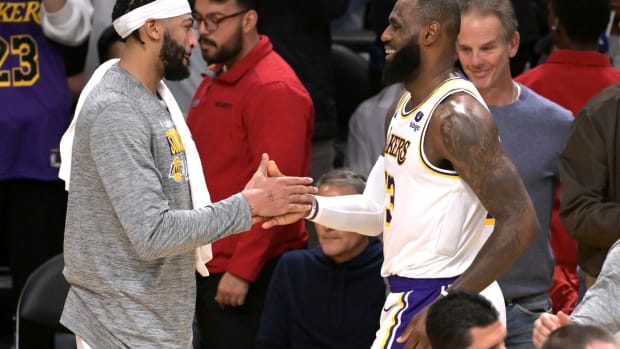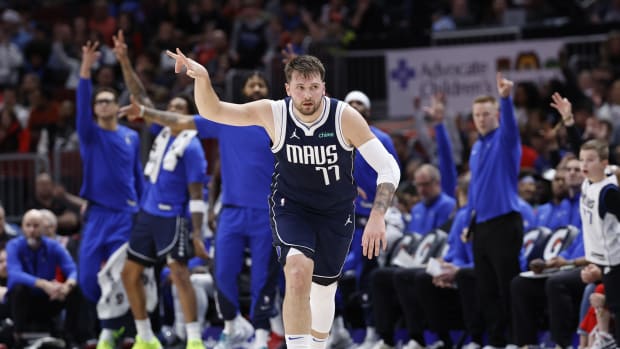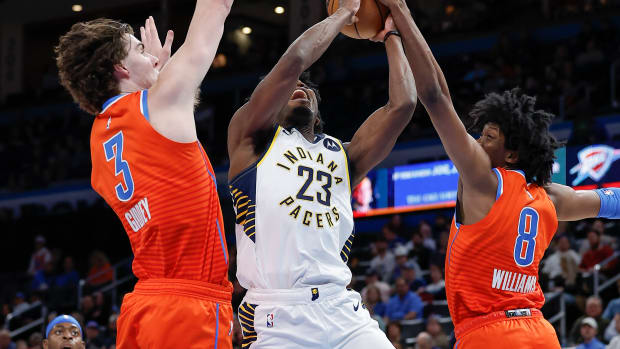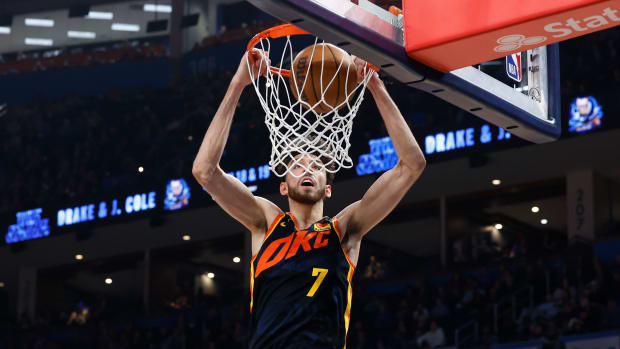Damian Lillard's Immortal Series-Winner Did All The Talking
The reason why the series hadn’t been quite as much of a series as anyone expected was Damian Lillard, and that was how and why it ended, and this is how we’re going to remember it. Lillard, with an empty clock ticking down, staring down Paul George from the logo, shuffling back to his right side, a clean look with one second left. The sound of Portland winning a playoff series. Lillard, waving goodbye to the Thunder before a dogpile took him off the court for good.
The shot attempt itself was something short of a prayer on a night where Lillard seemed to know exactly which of those would be answered, and how. The instantly-immortal dagger gave him 50 points and the Trail Blazers an 118–115 win, ending the first-round series in five games and in cold blood, cementing a 15-point fourth-quarter comeback. It was a superstar turn, the best individual performance of these young playoffs and the defining moment of an All-Star guard’s career. And in the kind of game where it felt like basically any shot anyone took from anywhere was going to drop, it certainly helps to have the best shooter available on your side.
When Lillard is at his most brilliant, your eye almost loses him in the flow of the game—he’ll give the ball up willingly, knowing he’ll get it back in a convenient location, knowing he’ll have the space to get off the quick-trigger release that makes him as dangerous as any guard anywhere. Tuesday, Lillard was making them almost haphazardly—if he sets his plant foot, he’s probably turning into a clean look. If you chase him over a screen, then he’s probably getting into the paint. He starts and stops and pops as well as anyone, and he did it as well as we’ve ever seen him do it. Lillard did not celebrate, and he didn’t have much to say, not until the end of the game, where his right hand talked for him.
Understandably, coming into these playoffs, much was made of the fact that Lillard and Russell Westbrook do not seem to like each other (though to be fair, most of the time, it doesn’t seem like Westbrook really likes anybody.) It wasn’t just the clashing personalities, but the on-court aesthetics. Lillard can be effervescent where Westbrook is omnipresent. He snarls and pounds the ball into oblivion and can’t be stopped in the open court. He can be tough to like, but it’s also kind of impossible not to appreciate the fact he is a singularity. The Thunder do have Paul George now (and he finished with 36 points), but they will never belong to him. Westbrook shot the ball 31 times (he made 11). His general quest for the basket has at times been something of a misadventure this series, and of course, he finished with a 29-point triple-double anyway, but this was not the way either player pictured this happening. Lillard, once the target of Westbrook’s barbs, had the final word.
The Thunder really couldn’t have opened the game in more composed fashion, at one point holding a double-digit lead with Paul George and Westbrook playing well, getting the other starters involved, and hitting jumpers. They dictated the pace early and got out in transition effectively. At first, it felt like it could be a long night in Portland. In opposition, for a while, there was only Lillard. In the end, he was enough.
Lillard finished the first quarter with 19 points while no other Trail Blazer had more than two. After the first 17 minutes of the game, Lillard had not yet gone to the bench and still no other Trail Blazer had more than two; he had racked up 27. Without resting, he had 34 at halftime on 12-of-18 shooting, including six threes. Portland took a one-point lead going into halftime, at which point you could have convinced me Dame also knew which Avengers were going to die and how Game of Thrones was going to end. To boot, all of this happened with C.J. McCollum more or less in absentia from the game flow.
The other thing you should know is that the other Trail Blazers (with the exception of an unsung Moe Harkless) were not especially good on Tuesday night, which is a big part of why the Thunder led by two going into the third quarter, at which point Lillard had scored 42. He’d hit threes to punctuate Portland runs and finished tough buckets to try and quell Oklahoma City’s momentum. Everything felt like it was going in, and the crowd hung on every bounce of shots that rimmed out. His first breather came at the start of the fourth quarter; the Thunder immediately went on an 8–2 run. When Lillard checked back in three minutes later, the Blazers trailed 98–90, which spiraled into 105–90 rather quickly.
But the Thunder could not control the clock when it counted, and Portland cut it back to eight, then five as Lillard hit his ninth three with five minutes left. Westbrook answered with a three of his own. As OKC clanked jumpers, missed free throws and lost its grasp, it became a one-possession game, tied by McCollum over George with 56 seconds left and answered by George’s jumper on the next possession. Then, again, it was Lillard pirouetting toward the basket for an awkward reverse finish that tied the game. Westbrook charged up the floor and heaved up a layup that rimmed out. Lillard brought the ball back up and didn’t bother calling timeout before ending things.
And so that was the series, with a Portland team that lost all four times to its opponent in the regular season pulling out four-of-five in a series that not enough people expected them to win. For many, those expectations will certainly shift, with the understanding that the Trail Blazers will have the best player on the floor no matter which of the Nuggets and Spurs they draw in the second round. This is a more mature, more confident Lillard than we’ve ever seen come playoff time, and he is over the first-round hump, moment in hand. Worry not about what comes next. We’ll be chewing on this one for a while.


































